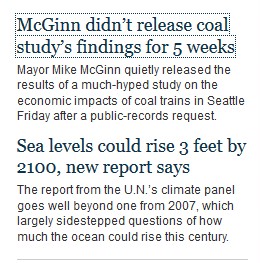It must be election season because this morning the Seattle Times managed to contort the publication of a small-scale economic analysis into a Shocking Scandal in the Mayor’s Race! The issue, as near as I can tell, is that about five weeks elapsed between the City receiving the first draft from a consultant and actually publishing the study.
Scandalous, I know.
The backstory is even less exciting than that. The first draft of the report—an economic analysis of the impact to Seattle of coal exports—was simply not very good. It featured basic factual errors, internal inconsistencies, and overt biases. City officials asked me to review the draft and provide comments. They shared my remarks with the consultant who then drafted a revised (and improved) version, which the City published last week. The quantified losses to Seattle from traffic congestion, property value losses, emergency response impacts, grade-crossing construction, and other impairments are mind boggling, ranging up beyond $500 million.
The City also contemporaneously published an addendum I wrote explaining that, while the report shows coal exports would be hugely costly to Seattle, it doesn’t go far enough. The truth is even uglier because the report does not provide any cost estimates for coal dust pollution, nor diesel exhaust from locomotives, nor public health impacts from the noise and vibration caused by coal trains. The report also does not tally the localized cost of impacts from global warming nor of air pollution caused by burning the coal.
Even weirder, coal export proponents seem to have seized on the Seattle Times election season spin as evidence that the report is somehow good news for them. They must be getting pretty desperate these days because the property value losses alone, pegged at between $270 million and $475 million, vastly outstrip any of the minor economic benefits that might accrue to the city from paying a few local engineers and PR firms to support developing coal export terminals, which they bullishly (and without evidence) trumpet as $28 million. (No joke: the coal supporters proudly draw attention to the fact that Seattle’s economic “benefit” includes payments to the PR flaks and lawyers who run interference on behalf of the coal industry.)
You don’t exactly need an advanced degree in economics to weigh the costs and benefits here.
 But if you want proof of how silly the whole thing is, it would be hard to do better than simply glancing at the homepage of the Seattle Times online this morning. Even as the world’s leading climate scientists warn of the sea level rising by three feet by 2100, the Times is twisting a debate about the wisdom of coal exports into an election year kerfuffle.
But if you want proof of how silly the whole thing is, it would be hard to do better than simply glancing at the homepage of the Seattle Times online this morning. Even as the world’s leading climate scientists warn of the sea level rising by three feet by 2100, the Times is twisting a debate about the wisdom of coal exports into an election year kerfuffle.
The Times has lately been doing some very good reporting on fossil fuel shipments—see here and here, for example—so it’s a shame to see this kind of treatment featured prominently.
Update 8/12/13: KC Golden has a very worthwhile perspective on the treatment of this study, framing it up as a tragic puppet show.









Chris
I am as opposed to coal trains in Seattle as you are, but what on earth was the mayor doing sitting on that report for so long and making the paper file a public records request to get him to release it? You give him a free pass on that. On this, you are showing far more bias than the Times. The mayor handled this very poorly and I don’t understand why.
Eric de Place
Except that’s not what happened. My understanding is that the mayor got a draft, had it reviewed, got a second draft, and then was scheduling publication when the paper filed the request. Five weeks between receipt of the first draft and final publication isn’t unusual at all for something like this.
The only thing that’s weird is that the Times wanted to make it an election issue.
Steve Erickson
Five weeks between first draft, review, second draft, and publication is incredible! that report moved like lightning!
Chris
Huh? The mayor can review the report all he wants, and take as long as he wants, but the Times wanted the actual report — not his review. The mayor isn’t the only one who gets to review it.
Michael Jackson
Floyd J. McKay, professor of journalism emeritus at Western Washington University, has been doing an excellent job covering the Coal train and coal export terminal issue on Crosscut.com.
That and Sightline’s research project on Northwest Coal Exports has proven to be very useful for my research. Thanks!
Steve Sylvester
If we could just get a cost estimate of oil trains coming to offload to ships in Vancouver, WA. PLEASE!
Eric de Place
Steve,
I encourage you to contact local public officials, including those at the Port of Vancouver. It will be important for the communities (and the region) to understand the costs of fossil fuel train movements. In Vancouver, WA especially the community should put some price on the risk associated with large scale oil train movements — risks that include oil spills and even, as in Quebec, explosions.
Phil Brooke
3 Port of Grays Harbor crude oil terminals’ impacts on communities along the rail corridors also, Cheney to Ocean Shores. It’s a massively negative impact.
Eric de Place
FYI, Sightline has published a comprehensive accounting of crude oil-by-rail projects in the Northwest. You can find more information about the Vancouver, Grays Harbor, and other proposals here:
http://www.sightline.org/research/the-northwests-pipeline-on-rails/